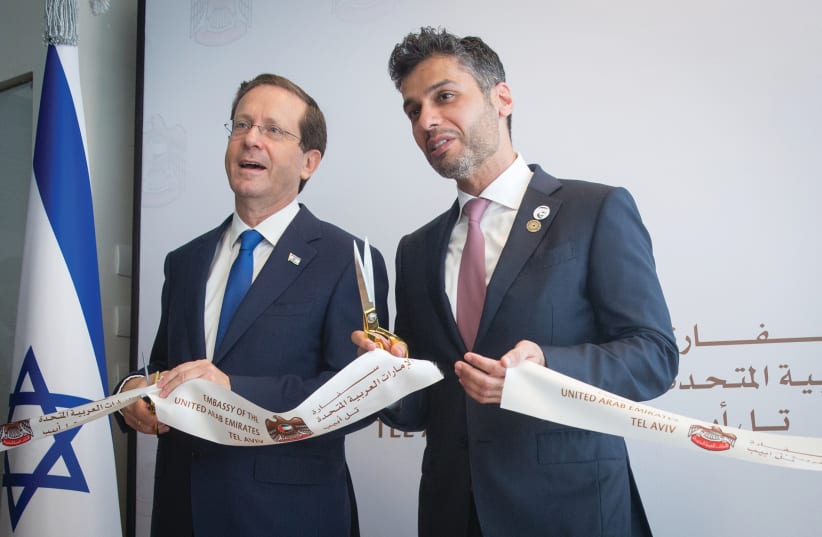The steps at this level are proceeding at an accelerated pace. This is proof of the common desire of both countries to take advantage of the valuable opportunity created by the signing of the peace agreement.
The most important message at the opening of the UAE embassy in Israel lies in its location. It is housed in the new Tel Aviv Stock Exchange building, in the heart of Israel’s financial district. That underscores the position of economics, business and investment in the cooperative relationship between the two countries.
The common bet of both sides is on creativity and innovation in the technical field as a locomotive to build a more prosperous future not only for the two peoples but also in the entire region. Security, stability and peace are all necessary conditions for development, which in turn needs the right environment to grow and prosper.
Cooperation between the UAE and Israel continues as planned, despite claims by some that normalization of relations has gone out the window, whether with the outbreak of violence between Israelis and Palestinians in Gaza in May, or former prime minister Benjamin Netanyahu’s move into opposition after failing to form a governing coalition.
To be sure, the bilateral relationship is based on areas of common interest, a well thought-out foundation and a long-term strategic vision that is not driven by a temporary perspective or a desire for political and media showboating.
The UAE is a country with a competitive future strategy. It must achieve the goals of these ambitious strategies by cooperating with various distinguished countries in such vital fields as science and modern technologies, including Israel.
Statistics show that it ranks fifth in the world in the innovation index. Its share of published scientific articles is well above its population to world population ratio. It has one of the highest patent rates in the world.
Israeli contributions in technology and scientific research are quite admirable and tempt any country that seeks to develop and progress through joint cooperation, with all the payoffs and benefits that entails for the advancement of countries’ development plans. Israel’s hi-tech sector accounts for over 40% of its exports. Israel is not called the “Start-Up Nation” for nothing.
On the other hand, the UAE’s major cities are the most attractive to such companies thanks to the favorable environment and government support. More than 35% of start-ups in the Middle East and North Africa are based in the UAE, according to official statistics. The process of cooperation between the UAE and Israel is indeed moving at a very fast pace.
Hardly a month goes by without mutual official visits, the signing of bilateral cooperation agreements, or the announcement of the implementation of plans and objectives contained in previously signed agreements. Since last August, when the signing of the peace agreement between the two countries was announced, one step at a time.
This demonstrates the common will of both countries to build a model for normalization of relations between Israel and its Arab neighbors. Building on serious and productive development cooperation, societies will feel the benefits of this cooperation away from political rhetoric and detractors.
The current developments in Emirati-Israeli relations show what was intended from the beginning of the normalization of relations “to chart a new course that will unlock great potential in the region.”
The joint statement issued by the US, the UAE and Israel on August 13 on the occasion of the announcement of the peace agreement revealed the two countries’ focus on intensive cooperation in the areas of investment, tourism, direct flights, security, communications, technology, energy, health, culture and environment, and the establishment of mutual embassies.
The ongoing UAE-Israel relations show the vision of our leaders that true peace and a culture of coexistence require serious action linking societies to what is happening on the ground to reap the benefits of policies, to motivate the Israeli side to engage strongly in efforts to find a true settlement of the Palestinian issue, and to end the conflict and restore peace.
That will also deprive the extremists of one of the most dangerous weapons they use to stay in the forefront of the regional scene as actors capable of creating tension and igniting destabilizing violence. The UAE embassy in Israel is an important step in building a model for future relations between Israel and the countries of the region.
Cooperation in areas such as construction, development, trade, and investment, for the benefit of both nations, opens the door for broader benefits and collaboration to the rest of the region.
The author is UAE political analyst and former Federal National Council candidate.
